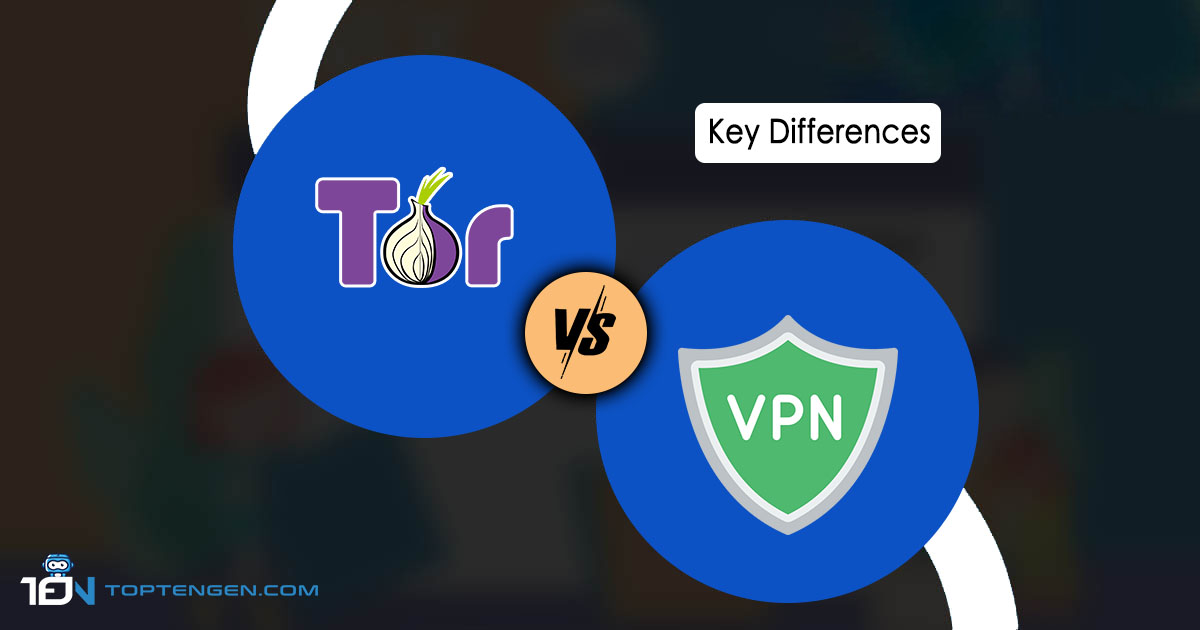For those wary of hackers and snoopers, Tor or VPN is the best choice for online security. Tor and VPN both are secure networking technologies that are designed to protect online privacy. Both of the software’s encrypts Internet activity and improve the overall security.
This guide will explore the key differences between Tor and VPN. Let’s dig deeper and learn about which one is better and how you can use them to protect your online privacy. Follow us along the whole journey of Tor vs VPN.
Tor vs VPN -Quick Summary
- VPN software changes your IP address by relying on privately owned servers of your choice. While the Tor network relies on a random, decentralized network of nodes for data transfer.
- VPN encrypts all the web traffic on your device. On the other hand, Tor encrypts traffic only from the Tor browser.
- VPN connections are comparatively faster than Tor. As VPN data only travels to a single server in a specified location while for Tor, it travels to various servers across the globe.
- VPN helps you pass geo-restrictions in an efficient way. Tor assigns a random IP location depending on the location of the exit node.
- VPN services have access to your IP address and online activity while Tor decentralized server provides full-fledge anonymity.
Tor vs VPN- What are they?
To start of with the comparison of Tor vs VPN, firstly let’s discuss their clear definition, how they work and the details pros and cons to evaluate each of them in detail.
What is Tor?
Tor is the abbreviation of “The Onion Router” is a network used for anonymous communication. With a range of servers scattered all across the globe, it is one of the best networks to remain anonymous on the web. As each server is maintained by individual volunteers so Tor connections are difficult to intercept.
How does Tor work?
Here ‘s a brief guide abouthow it worksand how you can utilize it to gain the advantages.
- When you enter a request, Tor software encrypts triple times for three different nodes. The entry node is often known as the guard node, the middle node (Middle server), and lastly the exit node
- Tor software sends your request to the entry node and it removes one layer of encryption and passes on to the next layer. As The guard node can read your IP address so your Internet service provider can know that you are using Tor. However, the guard node can still not read the encrypted content of the request, so all the activities inside the Tor network are untraceable.
- The traffic is then sent to the middle node, which again peels the second layer off. After this, the encrypted traffic is finally sent to the exit node.
- The exit node removes the final layer of encryption and hence can see the detailed encrypted request. But it cannot see your IP address and sender details. The node passes the message to the site you want to visit and when it’s done you are on the website.
This tool is overall more efficient in preserving your anonymity than privacy. The concept of anonymity and privacy may seem similar but privacy is hiding your online activity and anonymity is much more concerned about hiding your identity.
Tor: Pros and Cons
| Pros | Cons |
| Triple layer and complex encryption ensure complete anonymity | Data is browsed on multiple nodes, so the speed is slow |
| Free of cost and does not require subscriptions | Impractical to use Tor browser for downloading large files |
| Fewer technicalities to operate hence an easy-to-use software | Doesn’t bother encrypting data when it leaves the exit node |
| Decentralized and open source with no surveillance | Used primarily by criminals to participate in activities on dark web |
| Capable of going on Dark web | Tor Browser doesn’t work on all the platforms |
| Difficult to intercept as traffic is distributed on large number of servers | Nodes are operated by volunteers, so the process is less transparent |
| Tor browsers allow you to bypass censorship | Some sites block Tor users on their site |
When should you use Tor browser?
While knowing all the pros and cons, you will be wondering when to use it? So for this Tor gives optimal performance for:
- Accessing the dark web
- Anonymous web dowsing
- Untraceable communication due to various nodes
If you prefer to remain anonymous and want to access dark web, go for Tor browser.
What is VPN?
VPN encrypts your data and sends it straight to the intermediary server. VPN allows users to cruise privately while hiding the IP address. VPN service providers offer different VPN protocols and features to offer users a wide range of options.
Premium VPN uses high-level 256-bit encryption making it difficult for hackers to crack passwords and encryption keys. With VPN enabled at your device, you can effectively enhance your online privacy.
How does VPN work?
- With V PN, your internet traffic is encrypted and send to the remote server that changes your entire IP address.
- VPN server effectively decrypts your data and passes it on to the website you are browsing.
- Data arriving at your device from the network undergoes the same process.
To put this in simple words, VPN creates a private tunnel for your data, masking your Ip address. This way you can browse the web safely even if you are using a private internet.
VPN: Pros and Cons
| Pros | Cons |
| VPN encrypts online traffic so it offers enhanced privacy and security | Premium VPN are costly as they offer advanced features and functionalities |
| Accountability as it is easy to know who owns the server | Some VPNs may collect log data and sell it to third-party service providers |
| Premium VPNs offer top-level encryption | As internet traffic is encrypted and rerouted, so speed may be slower sometimes |
| Comparatively faster than Tor due to a simpler routing scheme | Some websites uses VPN-blocking technology and hence you cannot open such sites with VPN |
| Easy to bypass censorship due to choose of selecting location of VPN server | System relies on a single provider, so its difficult to look for reliable one. |
| Hide your online activity from ISP, preventing them to limit speed | |
| Premium VPNs offer threat protection, kill switch and smart DNS services |
When should you use VPN browser?
The next question that pops into the mind of readers while knowing about all the merits and demerits of VPN is when to use VPN? VPN works best for
- Access to the geo-restricted content
- Preventing bandwidth throttling
- Securing WIFI connections
If you live somewhere with strict censorship, investing in a VPN service is a considerable option. It is important to observe regulations, laws and service agreements.
Tor vs VPN- Key Differences
If you are eager to know about Tor and VPN, it is essential to know the key differences. While Tor and VPN both encrypt the data before it leaves the device, both have their separate roles in protecting the anonymity and privacy of users.
| Criteria | Tor | VPN |
| Speed | Slow | Fast |
| IP address | Randomly assigns IP address | Manually choose IP address |
| Network Type | Decentralized | Centrailized |
| Compatibility | Poor Compatibility | Widely Compatible |
| Anonymity | Complete Anonymity | Services can access data |
| Encryption Cipher | Advanced Encryption Standard (AES) | Advanced Encryption Standard (AES) |
| Dark Web | Provide access | Not supported |
| Price | Free | Subscription charges |
| P2P File Sharing | Slow and unsecured | Secure |
| Streaming | Not suitable | Suitable |
| Customer Support | Not provided at all | Good customer support |
Centralization vs Decentralized
One of the major differences between Tor and VPN is how they are managed. VPN is a centralized service which means a central authority controls and manages connections. VPN companies operate thousands of servers across the globe for the users to connect. With high-level privacy and fast connections, VPN is the preferred choice to protect online privacy.
Tor is decentralized which means none of the servers are controlled by a single entity. The nodes are operated by various volunteers all across the globe. When you connect to the Tor browser your connection is routed through different servers each time you visit a website. Also, it’s possible for the exit node to read unencrypted traffic passing through it.
Single-hop VPN vs Tor Onion routing
Quality VPNs often rely on a single proxy server. Outgoing data is encrypted on your device, sent to VPN server, decrypted, and sent to the end goal. Only a few VPNs offer multi- hop setup, but these are the exception.
Tor sends your data through three nodes and data is encrypted once at each node. A layer of encryption is removed at each node, passing on the data to the next node while hiding it from the previous node in the chain. As layers of encryption are removed at each node, the process is known as onion routing.
VPN apps vs Tor browser
When it comes to VPNs, you have a range of options to choose from. Most VPN services are available via downloadable options. Once you install the VPN application, your web traffic will be encrypted and rerouted to the private tunnel.
Tor can be used in a number of ways but users access the Tor network through the Tor browser. This is a Firefox-based web browser that is built to disguise the identity of users. It does not store web history, and won’t keep any cookies once you close the browser. Tor can be used in a number of other ways from applications like SecureDrop, Ricochet, and other operating systems.
Tor vs VPN: Which is better?
Although Tor and VPNs have a lot of things in common. The right choice will be dependent upon your needs and preferences. Tor is the best choice when online anonymity is your preference while VPNs best work for users who don’t want to compromise on security and privacy.
Tor is preferred over VPN when:
- Accessing the dark web
- Unable to afford high-quality VPN
- Seeking to release sensitive information and data
- Main concern is anonymity
VPNs are preferred choice over Tor when:
- Concerned about privacy and security
- Connecting to public Wifi
- Streaming and torrenting media
- By passing geo-restrictions
- Making online purchases at a reasonable price
VPN and Tor: Can they be used simultaneously?
Yes, you can use both Tor and VPN at the same time. The first approach is to access the Tor network through a VPN server beforehand. In this case, Tor will not be able to see your IP address and your Internet service provider won’t know that you are using Tor. However, this approach will not prevent you from malicious exit nodes.
If you go for Tor first and then VPN. your web traffic will be encrypted once it exits the final node of Tor network. In this case, not every VPN can provide such a connection. You need a special VPN that can support such connections. However, it is important to note that both methods slow down the internet.



